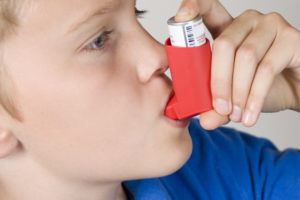 If you or a loved one have to deal with chronic allergies or asthma, then you’re probably more than aware of the health problems these conditions can cause. However, did you know they can also make a person much more likely to develop cavities, gum disease, and bad breath? Today, an Oklahoma City dentist offers 3 quick oral health tips for these patients so they can both breathe and smile easy as the years go by.
If you or a loved one have to deal with chronic allergies or asthma, then you’re probably more than aware of the health problems these conditions can cause. However, did you know they can also make a person much more likely to develop cavities, gum disease, and bad breath? Today, an Oklahoma City dentist offers 3 quick oral health tips for these patients so they can both breathe and smile easy as the years go by.
Tip #1: Tell Your Dentist
Whether it’s you or your child who has to deal with persistent breathing problems, it’s very important that you tell your dentist. They are well aware of the connection between allergies/asthma and oral health issues, and keeping them in the loop will allow them to tailor their approach and prevent some of the potential obstacles we’re going to mention below.
Tip #2: Watch Out for Dry Mouth
Dry mouth is a symptom where the mouth isn’t producing enough saliva to keep it adequately moist, and it is very common for people who take allergy medications or use inhalers. This allows bacteria to build up and cause a wide variety of dental problems. Saliva basically acts as like natural cleaner, and it’s very important to preventing both cavities and various other oral infections.
A person can help counteract dry mouth by:
- Always rinsing their mouth with water after using an inhaler, making sure to spit it out once it’s been swished around the teeth.
- Using a spacer with their inhaler. This enables the medication to enter the lungs more effectively and prevents it from lingering in the mouth afterward.
- Chewing sugar-free gum is an easy way to naturally stimulate more saliva flow in the mouth. Ask your dentist about which brands are best!
- Drinking plenty of water throughout the day.
Tip #3: Stay on Top of Oral Homecare
Because oral bacteria develops more easily in the mouths of people with allergies/asthma, sticking to a consistent oral hygiene routine is extremely important , as this will prevent the buildup of bacteria that can lead to oral health complications. A patient should brush at least twice a day for two minutes each, floss once, and regularly see their dentist for checkups and cleanings. This approach won’t only stop many issues before they start, but it will also allow a dentist to catch and treat small problems before they can become more serious later.
And with that, a person with these conditions should easily be able to enjoy a healthy, beautiful, and problem-free smile. Simply knowing about the connection to oral health is half the battle, and all it takes is a little diligence to give people one less thing to worry about.
About the Author
Dr. Don Swearingen is a native of Oklahoma City as well as a graduate of the Oklahoma University College of Dentistry. Today, he has been serving local families and providing comprehensive dental care for over 30 years right here in his home. If you would like more information on how to protect the oral health of a person with allergies/asthma, Dr. Swearingen is always happy to help, and he can be easily contacted through his website.
